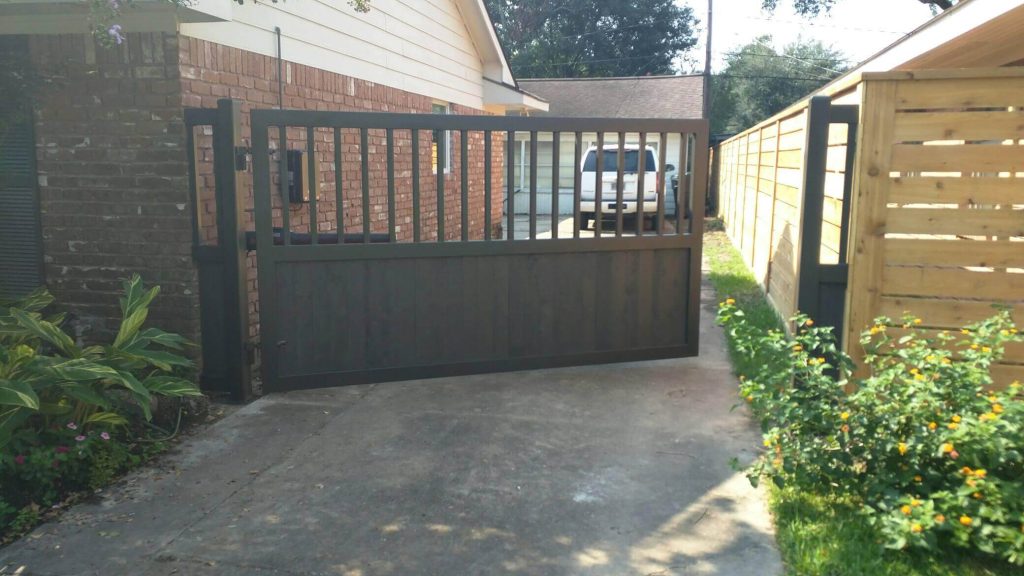Driveway Gates 101: Best Styles, Security, and Tips
We’ll explore how driveway gates serve as the first line of defense for your property while adding significant curb appeal and value to your home. From classic wrought iron swing gates to modern sliding designs, the options can seem overwhelming at first. But don’t worry – we’ve broken down everything you need to know about styles, materials, security features, and installation requirements. Whether you’re considering a basic manual gate or a fully automated system with cutting-edge security features, understanding these fundamentals will help you make an informed decision that perfectly suits your needs.

Key Points
- Choose between swing, sliding, or vertical lift gates based on your driveway’s space, slope, and accessibility requirements.
- Select durable materials like wrought iron, aluminum, or steel for long-lasting security and weather resistant driveway gates.
- Install electronic keypads, motion sensors, and safety beams to enhance security and protect people and vehicles.
- Ensure proper gate dimensions by measuring driveway width and adding necessary clearance for operation and emergency access.
- Maintain driveway gates through monthly inspections, regular lubrication, and protective coating applications to prevent wear and malfunction.
Types of Driveway Gates
When selecting a driveway gate, homeowners can choose from three main categories: swing gates, sliding gates, and vertical lift gates. Each type offers distinct advantages based on your property’s layout and security needs.
Swing gates operate like traditional doors, pivoting on hinges to open inward or outward. They’re ideal for level driveways with adequate clearance but aren’t suitable for sloped surfaces.
Sliding gates run parallel to your fence line on wheels or tracks, making them perfect for properties with space limitations or inclines. These gates won’t be impeded by snow or debris accumulation.
Vertical lift gates raise straight up, similar to garage doors. While they’re the most expensive option, they’re excellent for tight spaces and provide reliable operation in all weather conditions. They also offer enhanced security since they can’t be forced open like swing or sliding variants.
Regular professional servicing helps ensure smooth operation and extends the lifespan of automated gate systems.
Material Selection Guide
Since durability and aesthetics play pivotal roles in gate selection, choosing the right material requires careful consideration of your climate, maintenance preferences, and budget. We’ll help you navigate through the main options: wrought iron offers classic elegance and superior strength but needs regular rust prevention; aluminum provides excellent corrosion resistance and lightweight operation while maintaining a premium look; steel delivers outstanding security and longevity when properly galvanized; and wood creates a warm, natural appearance but demands consistent maintenance to prevent weathering.
For coastal areas, we recommend marine-grade aluminum or stainless steel to combat salt air. If you’re in an area with extreme temperature fluctuations, consider materials with minimal expansion and contraction properties. Remember, your choice will impact both long-term maintenance costs and your property’s curb appeal. Vinyl fencing options can provide exceptional durability while requiring minimal maintenance compared to traditional materials.
Security Features Worth Considering
Three essential security features transform a basic driveway gate into a robust access control system. First, we’ll want to install an electronic keypad or card reader that limits access to authorized users while maintaining a log of entries.
Next, we recommend integrating motion sensors and cameras that activate when someone approaches, allowing us to monitor activity in real-time through our smartphones or security systems.
Finally, let’s consider adding infrared safety beams that prevent the gate from closing when obstructed, protecting both vehicles and pedestrians.
For enhanced security, we can also incorporate features like automatic closing mechanisms, tamper alarms, and backup power systems. Together, these components create an extensive security solution that protects our properties while maintaining convenient access for those we trust.
The system’s two-way communication capabilities enable real-time interaction with visitors while maintaining a secure perimeter.
Sizing and Space Requirements
Proper sizing of your driveway gate requires careful consideration of several critical measurements. We recommend measuring your driveway’s width at both its entrance and along the intended gate location. You’ll need to add extra clearance – typically 3-4 feet – to accommodate the gate’s swing radius and hardware installation.
For sliding gates, we must account for the retraction space, which should be at least 1.5 times the gate’s width. When planning overhead clearance, factor in 8-10 feet for vertical lift gates or any decorative elements. Vehicle height requirements, snow accumulation, and landscaping features should also influence your measurements.
Remember to check local building codes, as many municipalities mandate specific width requirements for emergency vehicle access, typically a minimum of 12 feet. Our experienced team can help evaluate your property to ensure your custom iron gates provide both aesthetic appeal and proper functionality.
Automated vs. Manual Operation
Choosing between automated and manual driveway gates depends heavily on your security needs, budget, and convenience preferences. Automated gates offer enhanced security with remote access control, scheduled operations, and integration with home automation systems. We recommend automated systems for properties requiring tight access management or homeowners who frequently enter and exit.
Manual gates, while more affordable and maintenance-free, require physical effort to operate. They’re ideal for properties with minimal traffic or as backup systems during power outages. When selecting manual gates, we suggest installing smooth-rolling hardware and ergonomic latching mechanisms for easier operation.
Consider your climate too – automated systems need protection from extreme weather and may require heated motors in cold regions. Whatever you choose, we’ll want to guarantee proper installation of safety features like emergency releases and obstacle detection. Annual maintenance checks help extend the lifespan of both automated and manual gate systems while preventing potential operational issues.
Weather and Climate Factors
We’ll need to carefully consider how our local climate and seasonal weather patterns impact our driveway gate’s performance and longevity.
It’s crucial to protect gate mechanisms, motors, and electronic components from rain, snow, ice, and extreme temperatures through proper weatherproofing and protective housing. Regular seasonal maintenance, including lubricating moving parts and checking weather seals, will help prevent weather-related malfunctions and extend our gate’s operational life.
A reliable power source supply is essential since automatic gate openers require consistent electricity to maintain security and functionality in all weather conditions.
Protecting Against Harsh Elements
Since driveway gates face constant exposure to weather extremes, safeguarding them against harsh elements is crucial for their longevity and performance. We’ll need to apply protective coatings specifically designed for your gate’s material – powder coating for metal, weather sealant for wood, or UV-resistant finishes for vinyl. Let’s guarantee proper drainage around the gate’s foundation to prevent water damage and rust.
We recommend installing weather stripping and covers for electronic components, especially in areas with heavy rainfall or snow. Don’t forget to regularly clean and lubricate moving parts, as dirt and moisture can accelerate wear. For coastal locations, we’ll want to use marine-grade hardware and stainless steel components to resist salt corrosion. Remember to inspect weather seals and protective coatings annually to catch any deterioration early.
Maintenance During Seasonal Changes
As seasons shift throughout the year, your driveway gate requires specific maintenance adjustments to handle changing weather patterns. We recommend lubricating hinges and tracks monthly during wet seasons, and inspecting for rust formation after heavy rains.
In winter, we’ll need to clear ice buildup from mechanical components and guarantee motor housings remain properly sealed.
During spring and summer, let’s check for insect nests that can obstruct moving parts, and tighten any hardware that may have loosened due to thermal expansion. We should also test the gate’s auto-reverse sensors more frequently when temperatures fluctuate dramatically.
Remember to adjust the gate’s speed settings slower in winter for safety, as cold temperatures can affect hydraulic fluid viscosity and motor performance.
Building Codes and Permits
Before installing any driveway gate, checking local building codes and obtaining necessary permits is essential for compliance and safety. We’ll walk you through the key regulatory considerations to guarantee your installation meets all requirements.
| Permit Type | Requirements | Typical Timeline |
|---|---|---|
| Building | Site plan, gate specs | 2-4 weeks |
| Electrical | Wiring diagrams, power plans | 1-2 weeks |
| HOA | Design approval, setbacks | 2-3 weeks |
We’ll need to verify setback requirements, height restrictions, and emergency access specifications. Most municipalities require gates to be set back at least 20 feet from public roads. For properties with fire sprinkler systems, we’ll also need to install Knox boxes or override switches for emergency responders. Remember, non-compliance can result in fines or mandatory gate removal. Professional gate installation ensures proper integration with existing home security systems while maintaining compliance with local regulations.
Installation Best Practices
When installing a driveway gate, proper technique and sequencing will guarantee excellent performance and durability. We’ll need to follow essential steps and safety protocols to ensure our gate functions reliably for years to come.
Start with precise measurements and mark your post locations using string lines to guarantee perfect alignment – remember, we can’t compromise on this foundational step.
Pour concrete footings at least 24 inches deep (or below frost line) and let them cure completely before mounting posts.
Install hinges and gate hardware while checking level, plumb, and square at every step.
Test the gate’s swing path thoroughly, adjusting the automatic opener’s limit switches and safety sensors before finalizing the installation.
Always double-check measurements and use appropriate safety equipment throughout the process.
Consider installing access control systems like keypads or remote controls to enhance security and convenience.
Maintenance and Care Tips
Let’s protect our investment in driveway gates through essential maintenance practices that include monthly inspections and thorough cleaning with a non-abrasive cleaner to prevent debris buildup and corrosion.
We’ll need to safeguard against weather damage by applying appropriate protective coatings and ensuring proper drainage around gate posts and operators.
Following manufacturer specifications, we should lubricate all moving parts, hinges, and chain mechanisms every 3-4 months using weather-resistant lubricants designed for outdoor gate systems.
Establishing a routine maintenance plan with certified technicians helps prevent major system failures and extends the lifespan of automated gate components.
Regular Cleaning and Inspection
To maintain ideal performance and longevity of your driveway gate, regular cleaning and inspection should be performed at least every three months. We’ll want to check for any signs of wear, rust, or damage that could compromise the gate’s functionality and security.
Clean gate surfaces with a mild detergent and soft brush, paying special attention to hinges, tracks, and mechanical components.
Check all bolts, nuts, and mounting hardware for tightness while listening for unusual noises during operation.
Inspect electrical components, including motors, sensors, and wiring for proper connections and weather damage.
Lubricate moving parts with appropriate grease or oil, ensuring smooth operation while avoiding over-lubrication.
Protect Against Weather Damage
Proper weather protection represents one of the most critical aspects of driveway gate maintenance, especially since these structures face constant exposure to rain, snow, UV rays, and temperature fluctuations. We’ll need to apply protective measures based on our gate’s material type and local climate conditions.
| Weather Threat | Protection Method |
|---|---|
| Rain/Moisture | Waterproof sealant application |
| UV Damage | UV-resistant coating |
| Snow/Ice | De-icing solutions, rubber seals |
| Temperature Changes | Expansion joint maintenance |
For metal gates, we should apply rust-inhibiting primers and marine-grade paint. Wood gates require water-resistant stains and regular sealing. Don’t forget to check weatherstripping and drainage channels each season. If we’re in coastal areas, we’ll want to use additional salt-air protective coatings and inspect more frequently for corrosion signs.
Hardware Lubrication Schedule
Beyond weather protection, regular hardware lubrication stands as a fundamental requirement for maintaining smooth gate operation and preventing premature wear. We’ll help you stay on top of this essential maintenance task with a proven schedule that’s worked for countless gate owners.
- Monthly: Apply silicone-based lubricant to hinges, rollers, and chain drives while checking for proper movement
- Quarterly: Lubricate gate tracks, wheels, and all moving mechanical parts with weather-resistant grease
- Semi-annually: Service automatic opener mechanisms and inspect lubrication points for wear or corrosion
- Annually: Complete thorough maintenance including motor bearings, gear boxes, and underground operators
Don’t forget to wipe away excess lubricant to prevent dust accumulation. We recommend keeping a maintenance log to track your lubrication schedule and note any unusual wear patterns.
Cost and ROI Analysis
Installing a driveway gate represents a significant investment that can range from $2,000 to $12,000, depending on materials, automation features, and complexity. We’ve found that homeowners typically recoup 50-70% of their gate investment through increased property value, enhanced curb appeal, and improved security.
Let’s break down the ROI factors: Insurance companies often offer 5-15% discounts for secured properties, while real estate experts report that automated gates can add $5,000-$7,500 to a home’s market value. We’ll also see savings in reduced liability risks and potential theft prevention.
When calculating your ROI, consider ongoing costs like maintenance ($200-400 annually), power consumption for automated systems ($30-50 yearly), and periodic hardware replacement. These operational expenses typically represent 2-3% of the initial investment annually.
Smart home integration with modern gate access control systems can further enhance both convenience and property marketability.
Frequently Asked Questions
How Long Does It Take to Fully Open and Close a Driveway Gate?
We’ll typically see residential driveway gates complete their opening or closing cycle in 12-20 seconds, though timing can vary based on gate weight, motor power, and safety requirements.
Can Emergency Responders Access My Property if the Gate Loses Power?
We’ll guarantee emergency access through your gate’s manual release mechanism and Knox Box system, which first responders can operate even during power outages to quickly reach your property.
Will My Pets Be Able to Slip Through or Under the Gate?
We’ll help prevent pet escapes by installing bottom rails with gaps under 4 inches, mesh panels between pickets, and safety sensors that won’t close if pets are detected underneath.
How Noisy Are Automated Driveway Gates During Operation?
We’ll hear some operational noise from modern gate motors at 50-70 decibels, similar to normal conversation. Quality rollers, proper lubrication, and regular maintenance help minimize unwanted sounds during opening and closing.
Can I Temporarily Disable the Gate During Large Events or Parties?
We’ll help you temporarily disable your gate using the manual release function. First, guarantee you’ve got the override key, then switch to manual mode following your system’s safety protocol.
Takeaway
We’ve covered the essential aspects of driveway gate selection, installation, and maintenance. By carefully considering gate type, materials, and security features while adhering to local building codes, we’re ensuring a safe, compliant installation. Regular maintenance protocols, including mechanical inspections and weatherproofing, will maximize our investment’s longevity. When properly installed and maintained, these gates provide both enhanced security and property value appreciation.








